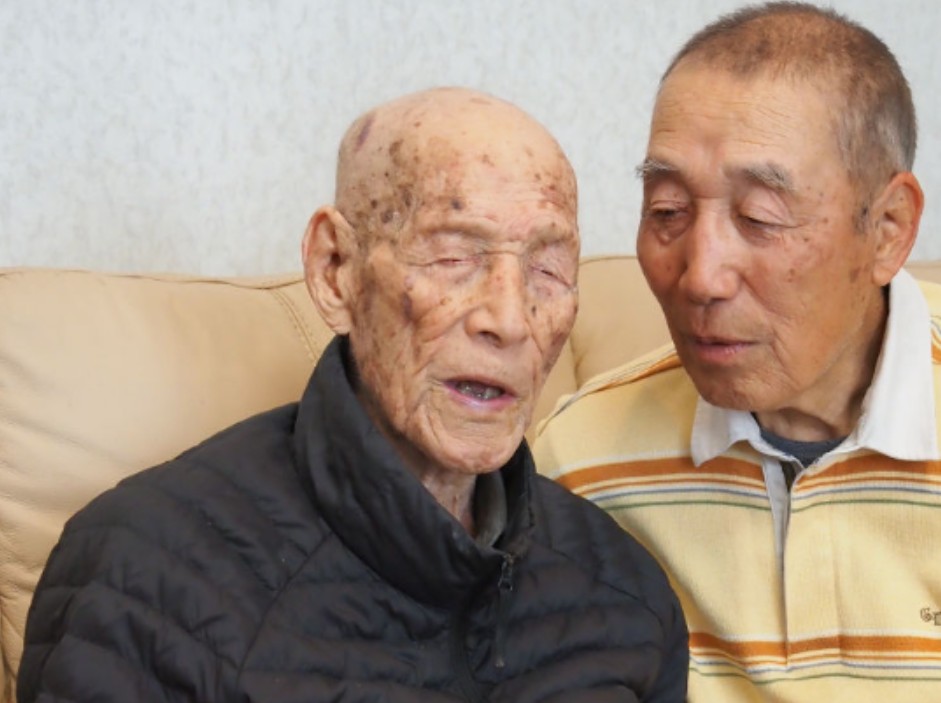Kiyotaka Mizuno, Japan's oldest man, celebrated his 111th birthday on 14/3 at his home in Iwata City, Shizuoka Prefecture. Mayor Hiroaki Kusachi visited Mizuno to offer congratulations, stating, "Your health and longevity are a source of hope for our citizens. I hope you'll strive to become the world's oldest man."
When asked about his secret to longevity, Mizuno replied, "I don't dwell on worries or anxieties. I never imagined I'd live this long. I simply aim to live each day peacefully without burdening others."
Born in 1914, Mizuno has lived through four imperial eras: Taisho, Showa, Heisei, and Reiwa. In his youth, he served as an imperial guard at the palace during the time of an attempted military coup in Tokyo. A faction of young military officers assassinated key government figures and occupied part of the capital before being suppressed. During World War II, Mizuno was deployed to the front lines, later returning to Iwata. After the war, he became a farmer, cultivating crops like taro and scallions until the age of 80.
According to LongeviQuest, an organization that verifies and documents the ages of the world's oldest people, Mizuno began paying close attention to his diet around the age of 100. His daily routine begins with waking at 6:30 am and having breakfast at 7:00 am. He eats three meals a day, focusing on seasonal ingredients and consuming only about 70% of the recommended portion sizes. Every morning, he eats a banana, and his dinner always includes yogurt. He also enjoys two snacks: milk and castella sponge cake at 10:00 am, and a bottle of Yakult and cookies at 3:00 pm.
Dr. Naushira Pandya, chief of geriatrics at Nova Southeastern University in the US, notes that centenarians often prioritize sleep. They tend to rise early with the sun, meaning they go to bed early and maintain 7 to 9 hours of sleep nightly. Dr. Gary Small, a geriatric psychiatrist and chair of psychiatry at Hackensack University Medical Center (US), explains that sleep is when the brain clears debris and amyloid, a protein that accumulates in Alzheimer's disease.
He adds that sufficient sleep also helps maintain the immune system and reduce inflammation. A study of centenarians revealed that 55% slept more than 8 hours per night, and 28% took daily naps. Researchers found these individuals had lower cholesterol levels and fewer age-related diseases.
 |
Kiyotaka Mizuno (left). Photo: News Yahoo |
Kiyotaka Mizuno (left). Photo: News Yahoo
Mizuno currently lives with his eldest son, daughter-in-law, and grandchild. Despite his age, he remains active. During the day, he sits in a chair and exercises his limbs. Family members turn on his favorite television channels, allowing him to enjoy news programs and live sports broadcasts. He previously maintained a habit of reading the newspaper and walking around the house daily for exercise. Mizuno also used to enjoy a nightly drink but gave it up at age 95. Having lost his hearing, he now connects with the world by listening to sumo wrestling and marathon broadcasts through headphones.
A study published in the British Journal of Sports Medicine in November 2024 showed that walking for 11 minutes daily could add over a decade to one's lifespan compared to those who are less active.
According to Japan’s Ministry of Health, Labor and Welfare, as of 1/9, the number of centenarians nationwide exceeded 99,700, an increase of over 4,600 from the previous year, marking the 55th consecutive year of record-high numbers. Women account for over 80% of this population, numbering over 87,800. In addition to Mizuno, Japan's oldest woman is 114-year-old Kagawa Shigeko, who lives in Nara Prefecture.
Binh Minh (News Yahoo, LongeviQuest)












